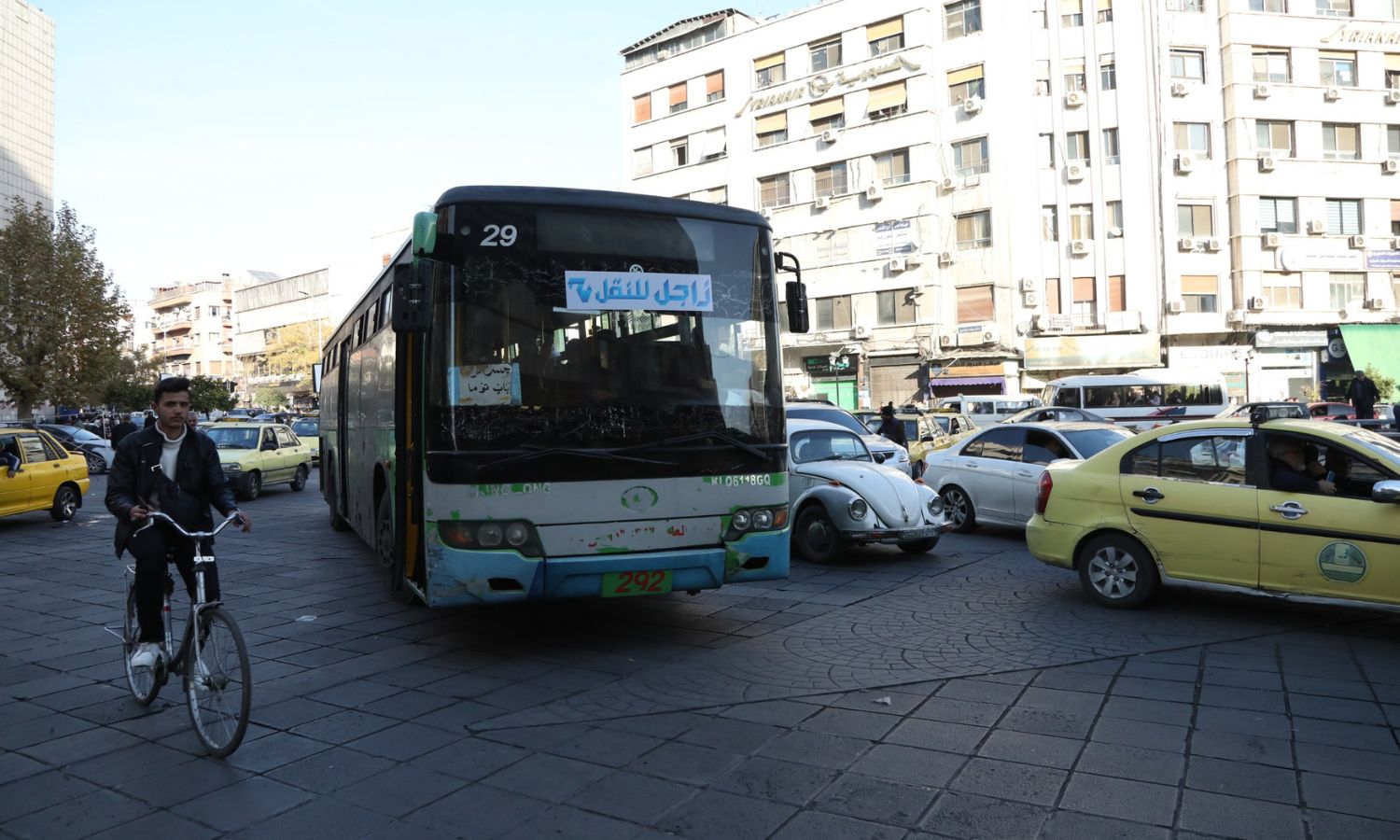



Damascus – Anas al-Khouli
Following the fall of the Syrian regime on December 8, various areas in Damascus and its countryside have witnessed a transportation crisis, alongside a rise in transport prices surpassing the citizens’ financial capacities.
According to a report by Enab Baladi’s correspondent, the crisis stems from fuel shortages at gas stations, the absence of subsidized diesel at reduced prices, and the exploitation of drivers and minibus owners who have raised fare prices higher than expected.
The cost of transportation for routes within Damascus or connecting Damascus with its suburbs has increased by 300%, with fares being determined by vehicle owners without any regulatory entity overseeing them.
Talal al-Shami, 37, living in Qudsaya and working in a restaurant in Damascus, told Enab Baladi that he used to pay 1,500 Syrian pounds to travel from Qudsaya to the capital. Today, he pays 5,000 Syrian pounds, an increase of more than three times the previous transport fares.
Al-Shami noted that his daily wage does not exceed 40,000 Syrian pounds, forcing him to pay a quarter of it just for transportation (to and from work), which has caused significant problems in managing his household expenditures.
According to Enab Baladi‘s correspondent, citizens are compelled to accept the fares imposed by minibus owners due to the limited number currently available. Bus stops are witnessing cases of crowding among passengers trying to secure transportation.
The transportation fares for short distances within Damascus have reached 3,000 Syrian pounds, medium distances 5,000 Syrian pounds, while fares between Damascus and the countryside have reached 8,000 Syrian pounds. The fare for internal bus transportation stands at 2,500 Syrian pounds.
Transport vehicle owners and drivers interviewed by Enab Baladi attributed the rise in transport fares to the fuel shortage for public transport vehicles and soaring fuel prices, alongside maintenance costs. They considered that current prices, although high for citizens, are very low and insufficient in reality.
Saleh al-Obeid, 47, a minibus driver with a capacity of 14 passengers, explained to Enab Baladi that he continues to work without interruption to secure his family’s livelihood, noting that stopping work during this period would be more cost-effective than paying for fuel and maintenance costs.
He added that drivers face challenges in securing diesel fuel at high prices, pointing out that he works all day just to transport a single group of passengers due to the inability to secure sufficient fuel for multiple trips between the capital and the countryside.
The driver mentioned that he often gets into disputes and arguments with passengers every morning because they believe the fare increase is due to greed and avarice, yet they do not acknowledge the rising diesel prices, the high maintenance costs, and the unavailability of spare parts for vehicles.
Diesel prices have begun to gradually decrease in Damascus since December 15, dropping from 18,000 Syrian pounds per liter to 15,000.
According to Enab Baladi’s correspondent in Damascus, fuel is available at some gas stations, but is absent at others; however, it is abundant in the black market at higher prices than those at licensed stations and without regulations.
The transportation crisis is not new to the capital and various areas of Syria; it has been a recurring issue since the outbreak of the Syrian revolution in 2011, due to the deterioration of the economic situation and rising fuel prices.
The government of the ousted president, Bashar al-Assad, used to distribute fuel quotas to those living in controlled areas in a regulated manner, forcing them to resort to the black market to meet their needs. Prices vary based on supply and demand, and when shortages occur, prices escalate, but they may fall back when resources are available properly.
Additionally, most consumer goods prices are affected by fuel price hikes, amidst a declining purchasing power and deteriorating economic conditions, leading many families to rely on remittances from Syrians living abroad to meet the minimum living requirements.
The caretaker government, tasked until March 2025, has promised to provide essential services for citizens and gradually resolve issues, as people await initial improvements in services in the foreseeable future.
if you think the article contain wrong information or you have additional details Send Correction